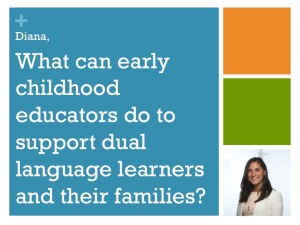 Happy Real World Wednesday! This week we have the pleasure of featuring Diana Serrano.
Happy Real World Wednesday! This week we have the pleasure of featuring Diana Serrano.
Diana is a third year PhD student at the Heller School of Social Policy and Management at Brandeis University. Her research interests vary, but she is most interested in the developmental outcomes of children of immigrants in early education care settings. Most recently, Diana worked at the Children’s Trust. During her time at the Children’s Trust Diana worked to construct a measurement tool that assesses parental capacity. Her previous work at the Office of the Superintendent of Education (OSSE) in Washington, DC focused on the educational outcomes of English language learners in special education. While she worked at the Migration Policy Institute, Diana’s research focused on early education access as a strategy to civically, socially, and economically integrate immigrant families and children. Diana hopes to continue to expand her understanding of developmental trajectories for young children of immigrants who participate in home visiting programs.
Given her expertise, we asked Diana: What are some things that early childhood educators can do to support dual language learners and their families?
Here’s what she said:
I have spent some time thinking about the most practical ways that early childhood educators can best support dual language learners and their families.
While the process of identifying a child as an English language learner might vary from school district to school district, once a child is a identified as an English language learner, the child is entitled to certain rights and accommodations. Perhaps one of the most helpful things an educator can do, is help parents understand, not only the importance of going through the formal identification process, but also to understand what their rights are. All too often parents are unaware of the rights their child is entitled to and this makes it challenging for a parent to serve as the best possible advocate for her/his child.
An early childhood educator is beautifully positioned to serve as an educator for the parent, but more importantly for the child. At the national level, the topic of educational approaches for English language learners has been politicized. Unfortunately, there exist many discrepancies between what some policies mandate and what science tells us. While there are English only policies in place in most states in the country, we know that children who come from a non-English home are better positioned to fulfill their potential when they are part of an environment that values and celebrates their home language and cultural practices. While it is difficult to cater to the needs of every individual child (given the diversity of language backgrounds), the notion that learning English should come at the expense of speaking to a child in their native tongue is simply negated by the scientific evidence.
Educators might be unable to speak the language of their students; however, this need not mean that the child should be discouraged from expressing her or himself in the preferred language. Educational approaches vary greatly, but it is important to note that approaches that provide educational opportunities for children in their native language positively impact the socio-emotional and cognitive development of the child.
Thanks so much Diana for taking the time to share your knowledge with us!